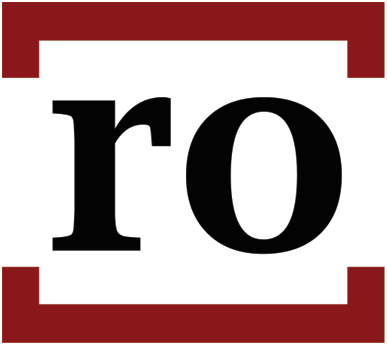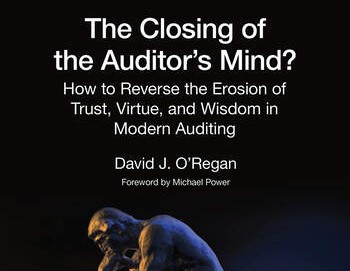Risk Oversight sits down with David J. O’Regan to discuss his latest book, The Closing of the Auditor’s Mind?, and the challenges facing the Internal Audit profession today
Dr. David J. O’Regan is the Auditor General of the World Health Organization (Americas Region) and a Fellow of the Institute of Chartered Accountants in England and Wales. His newest book, The Closing of the Auditor’s Mind? releases on December 10 (and is available for preorder now) is his 9th (wow!) book on internal audit.
I first connected with O’Regan when I stumbled on an article he wrote a few years ago in the IIA magazine and wrote about it on LinkedIn. We began a friendly exchange of ideas that has continued over the years through our writing about how to bring more meaning and value to internal audit and the GRC profession.
1. You’ve written 8 books already on Internal Audit (impressive!). What motivated you to write your latest book The Closing of the Auditor’s Mind?
Thank you for inviting me to participate in this interview, Adrienne, and for your interest in my writing. It’s my pleasure to interact with you and your newsletter community.
My first book on internal auditing was published in 2001 by the Institute of Internal Auditors (IIA), and in the subsequent years, I wrote several books published by the IIA as well as by Wiley, all on the theme of advising on good auditing practices.
More recently, I’ve become more interested in the theoretical side of internal auditing, asking why we do what we do, and questioning the directions that internal auditing has taken in recent years.
My forthcoming book The Closing of the Auditor’s Mind? focuses on these types of issues. I try to go to the roots of what the purpose of internal auditing is, and I discuss topics I believe to be important for the future of our profession.
- Can you be a bit more precise as to the contents of the new book?
Absolutely. The official narrative of the internal auditing profession is that we are constantly deepening and expanding our knowledge base, our technological tools, our institutional importance, and even our social and political clout. I find all these claims questionable. On the contrary, I think that internal auditing is on the threshold of two basic challenges that threaten to destroy the purpose and credibility of internal auditing as it’s currently practiced.
The first challenge is an external one. The center of gravity of accountability has shifted on its axis for some time away from traditional, vertical, bureaucratic organizations to horizontally-distributed networks. In other words, we’re on the threshold of a deconstruction of traditional, bureaucratic organizations into flattened and fragmented patterns of accountability.
Internal auditing sat quite comfortably with the older style of bureaucratic organization, where delegations of authority ran downwards and accountability upwards along the same channels. Those patterns are clear and easy to understand. But the emerging patterns of networked accountability are fast-moving, disorienting, confusing, often barely visible, and sometimes unstable. And they are highly risky.
- Can you give examples of what you mean by the new networked patterns of accountability?
Sure. Let’s consider the gig economy. Instead of people working for an employer for life, they are increasingly flitting from job to job, often juggling different jobs simultaneously. In our work, we have increasing choice and increasing risks. We are freeing ourselves from the inflexible patterns of old-style employment but work in the gig economy is often transient and fragile.
We see the risky, diffuse patterns of modern accountability everywhere around us. For example:
- Few of us would take the risk of hitchhiking, but most of us are ready to use ride-hailing services with strangers
- Many of us pamper our dogs to the point of protective fanaticism. And yet, we trust the wellbeing of our dogs to unknown dog walkers we hire with the click of a mouse.
- We fret over our personal safety but are willing and ready to date strangers based on a few pictures, taglines, and swipes.
In many ways, our digital networks are providing us with immense freedom but at high risk where the accountability underpinning these freedoms is difficult to define. In big networks, if everyone is equally accountable, then perhaps nobody is truly accountable too.
4. Where do you believe the Internal Audit profession is heading? What are some of the biggest drivers influencing changes to the profession?
Well, a little earlier I mentioned that my forthcoming book is based on two challenges facing the internal auditing profession. We’ve just discussed the first related to shifting patterns of accountability which is an external challenge.
The second challenge is an internal one facing the internal audit profession. In my opinion, I see an alarming decline in the space for internal auditors to exercise their creativity, judgment, and moral agency.
Look for example at the IIA’s revised standards — they claim to be principles-based, but such claims are disingenuous. The 15 principles in the new standards serve solely as headings, and the standards themselves are prescriptive. This prescriptiveness is squeezing our individual judgment.
Collectively, in my view, we as internal auditors are increasingly filling out checklists and undertaking algorithmic auditing. This clockwork approach to internal auditing increases the dangers of our profession being taken over by Artificial Intelligence (AI) and other forms of machine processing.
The increasingly formulaic style of auditing is, it seems to me, a main driver of change in our profession. And it’s not a change for the better. For example, there is a lot of talk of embracing technology, and this is fair enough – I’m not a Luddite. But there seems to be little realization within our profession that we are becoming subservient to technology. Technology is increasingly seen as an end in itself, rather than as a means to an end.
5. Is Internal Audit meeting the needs of our modern-day organizations?
I would say that good internal auditing is fundamental to healthy institutions, but unfortunately the checklist style of auditing is undermining its effectiveness. So, I’d have to say that the modern organization is not generally being well-served by internal auditing.
There are exceptions, of course, but the trend seems to me to be a downward spiral. The gap between the official rhetoric of the internal auditing profession and the disappointing reality is widening. And without reform, I believe that new forms of organizational assurance will start to emerge to satisfy the demands of innovative, creative assurance. Internal auditing will be left behind, becoming a kind of historical curiosity full of hollow bluster about risk and trust. It’s a rather bleak picture.
6. In your writing, I love that you emphasize the need for Internal Auditors to exercise their creativity, professional judgment, and critical thinking. What are the threats to achieving these in the Internal Audit profession today?
I believe that the main way the internal auditing profession might avoid the impending crisis we’ve been discussing is to reconnect with its humanistic roots. By this, I mean that a reduction of prescriptiveness and checklists and algorithms is needed. These all have a place in internal auditing, but they have become the golden calves of the present generation of internal auditors. Instead, we should return to traditional notions of the informed opinion, the creative assessment of evidence, and the innovative thinking that built our profession.
If internal auditing disappears down the rabbit hole of formulaic mechanization it will, I fear, be doomed. We cannot afford to spend the next few years tinkering at the edges of internal auditing. A radical repositioning of our profession will be needed if it is not to be overtaken by the changing socio-economic landscape.
7. What do you believe are some of the biggest threats or obstacles to the Internal Audit profession today, and what do you see as the biggest opportunities for Internal Audit to support organizations today and for the future?
In my forthcoming book I make various suggestions as to how to rescue the profession from its current malaise. For example, by reinvigorating internal auditing with qualitative assessment and big picture perspectives to counter the prevailing tendencies toward an almost superstitious trust in the power of numbers.
I also encourage a less “cookbook” style of professional standards to free up our individual judgment. I also, in a broader sense, call for a greater competition of ideas in the profession, to counter the troubling drift toward groupthink and facile slogans (like the slogan of the auditor as a “trusted partner” and the effect of the revised standards as “elevating the profession”). Such sloganeering dampens originality of thought.
You’ve let me go on at length, so I thank you, Adrienne, for this opportunity. In the preface of my book, I am going to ask for readers’ feedback on my suggestions. I hope that my book will contribute to the current debates surrounding internal auditing and assist in putting internal auditing back on track.
**********************
We are deeply grateful to David J. O’Regan’s participation in this interview and sharing this exceptional material with us and our community. His 9th book, The Closing of the Auditor’s Mind? is coming out December 10th 2024 and is available for preorder on Amazon. We hope that you all pick up your own copy to share with the GRC community.

